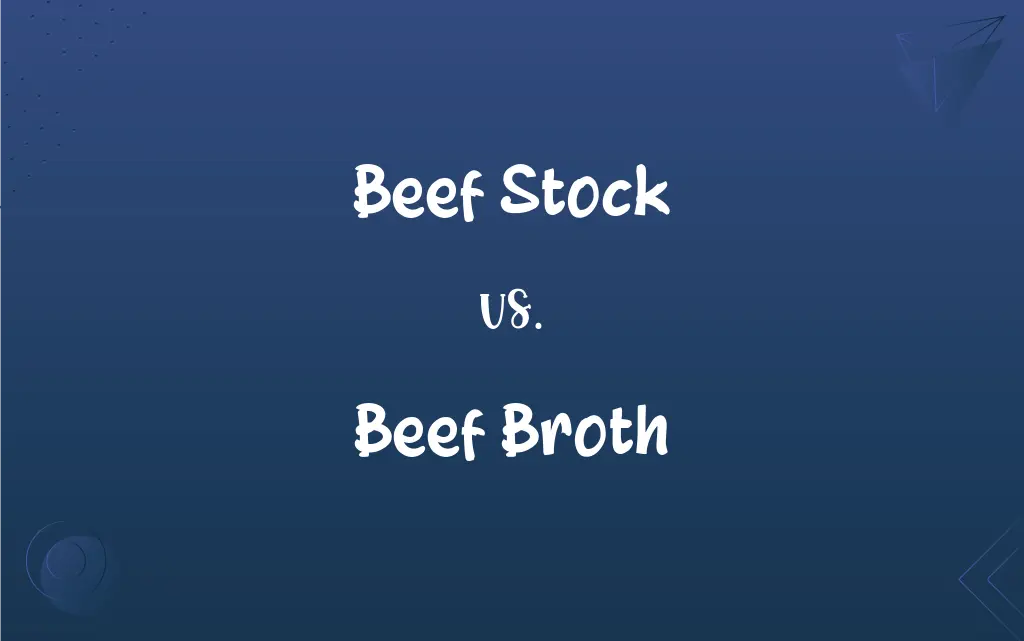Beef Stock vs. Beef Broth: What's the Difference?
Edited by Janet White || By Harlon Moss || Updated on October 10, 2023
Beef stock is made by simmering bones, while beef broth is made from simmering meat, often with some bones, providing distinct textures and flavors.

Key Differences
Beef stock is generally crafted by simmering bones, often roasted first to enhance flavor, providing a rich, gelatinous liquid. Beef broth, conversely, is typically lighter, made by simmering meat, possibly with some bones, yielding a flavorful but less dense liquid.
Culinary experts frequently opt for beef stock when a hearty, robust base is essential for dishes like stews and gravies due to its thick, gelatinous texture. Meanwhile, beef broth is commonly employed in scenarios where a lighter, more aromatic liquid is desired, such as in soups or for braising vegetables.
It is pivotal to note that beef stock generally requires a longer simmering time compared to beef broth to extract the gelatin from the bones, which contributes to its distinctive texture and richness. Conversely, beef broth usually necessitates a comparatively shorter cooking duration, preserving the fresh, meaty flavor.
In certain cooking scenarios, beef stock might be preferred for its ability to provide a substantial, meaty flavor without the addition of actual meat. Alternatively, beef broth, with its gentle yet savory character, could be utilized as a standalone dish, like in a clear soup, or as a warm, nourishing drink.
Additionally, it’s crucial to comprehend that beef stock, due to its rich and viscous nature derived from bone marrow, can impart a velvety texture to sauces. On the flip side, beef broth, while flavorful, lacks the gelatinous property of stock but imparts a delightful, meaty flavor to dishes without adding heaviness.
ADVERTISEMENT
Comparison Chart
Part of Speech
Noun
Noun
Plural Form
Beef Stocks
Beef Broths
Example Sentence
The beef stock simmered for hours.
She sipped the warm beef broth.
Associated Words
Rich, Gelatinous, Hearty
Light, Flavorful, Clear
Usage in a Phrase
A rich beef stock base
A bowl of savory beef broth
ADVERTISEMENT
Beef Stock and Beef Broth Definitions
Beef Stock
Commonly used in hearty dishes.
Beef stock was the foundation of the stew.
Beef Broth
A flavorful, meaty liquid.
The beef broth was fragrant and satisfying.
Beef Stock
A rich, dense liquid.
Beef stock adds depth to sauces and gravies.
Beef Broth
Generally lighter than stock.
The soup contained a clear beef broth.
Beef Stock
Made primarily from bones.
The beef stock was simmered with marrow bones.
Beef Broth
Can be drunk on its own.
He enjoyed a cup of warm beef broth in the evening.
Beef Stock
Can be homemade or store-bought.
She opted for store-bought beef stock for convenience.
Beef Broth
Used in a variety of dishes.
Beef broth was added to enhance the rice flavor.
Beef Stock
Often gelatinous when cool.
Upon cooling, the beef stock became jelly-like.
Beef Broth
Made by simmering meat.
She prepared the beef broth using quality cuts.
FAQs
What is beef stock?
Beef stock is a rich, gelatinous liquid made by simmering bones, often with vegetables and seasoning.
What distinguishes beef broth?
Beef broth is a flavorful liquid resulting from simmering meat, often along with vegetables and spices, and is typically not as dense as stock.
Can beef stock and beef broth be used interchangeably in recipes?
They can be used interchangeably in many recipes, though the final dish may have slight variations in flavor and texture.
Does beef broth contain gelatin?
Beef broth generally contains less gelatin than stock since it's made primarily with meat and not simmered as long.
What can I add to beef stock for additional flavor?
Ingredients like onions, carrots, celery, garlic, and herbs can be added to beef stock to enrich its flavor.
Can beef broth serve as a substitute for beef stock?
Yes, beef broth can substitute beef stock and vice versa, but note the difference in texture and flavor intensity.
How is beef broth typically used in cooking?
Beef broth is widely used in soups, stews, sauces, and for braising meats and vegetables, offering a meaty flavor without heaviness.
Can homemade beef broth be canned for long-term storage?
Yes, beef broth can be pressure-canned to ensure safety and shelf-stability for long-term storage.
Can I consume beef broth as is?
Yes, beef broth can be enjoyed as a warming beverage or a base for soups due to its lighter, flavorful nature.
Is store-bought beef stock as nutritious as homemade?
Homemade beef stock may contain more nutrients and less sodium or preservatives compared to many store-bought options.
Can I enhance the flavor of store-bought beef stock?
Yes, simmering store-bought beef stock with additional vegetables, herbs, and seasoning can elevate its flavor.
Is it possible to prepare a vegetarian version of beef broth?
Absolutely, using umami-rich ingredients like mushrooms and soy sauce can mimic a meaty flavor in vegetarian broths.
What kinds of bones are preferred for beef stock?
Typically, marrow and knuckle bones are favored for making a rich beef stock.
Is beef stock usually darker than beef broth?
Generally, yes, beef stock tends to be darker due to the longer simmering of bones, which may be roasted first.
Why does beef stock gel when cooled?
Beef stock gels upon cooling due to the gelatin extracted from simmered bones.
Is it essential to roast bones for beef stock?
While not mandatory, roasting bones for beef stock can deepen its color and enhance flavor.
How can I store leftover beef broth?
Beef broth can be refrigerated for up to 5 days or frozen for several months.
Can I use beef broth in vegetarian dishes?
Yes, beef broth can add a savory depth to vegetarian dishes, but note it's not suitable for vegetarians or vegans.
How long should beef stock typically be simmered?
Beef stock is usually simmered for a longer period, often 4-6 hours, to extract gelatin from the bones.
Can beef stock aid in enhancing the texture of sauces?
Indeed, the gelatin in beef stock can lend a rich, velvety texture to sauces and gravies.
About Author
Written by
Harlon MossHarlon is a seasoned quality moderator and accomplished content writer for Difference Wiki. An alumnus of the prestigious University of California, he earned his degree in Computer Science. Leveraging his academic background, Harlon brings a meticulous and informed perspective to his work, ensuring content accuracy and excellence.
Edited by
Janet WhiteJanet White has been an esteemed writer and blogger for Difference Wiki. Holding a Master's degree in Science and Medical Journalism from the prestigious Boston University, she has consistently demonstrated her expertise and passion for her field. When she's not immersed in her work, Janet relishes her time exercising, delving into a good book, and cherishing moments with friends and family.






































































